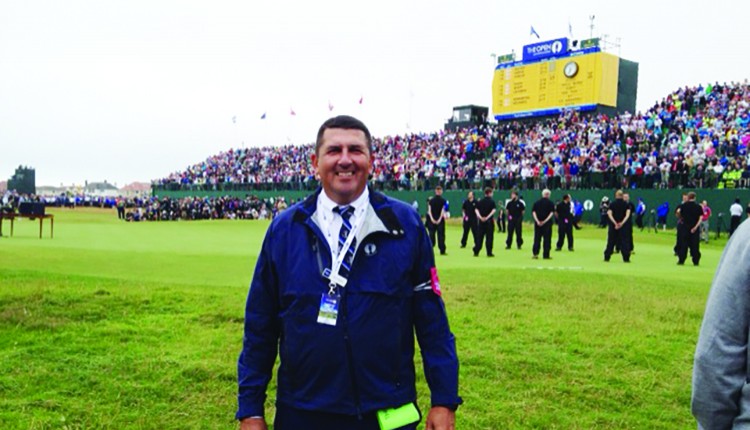
We all remember what happened to Tiger Woods on the 15th hole in the second round of the 2013 Masters.
The guy who used to be the best golfer on the planet was right in the thick of things atop the leaderboard, playing his short approach to the second par five on Augusta National’s back nine. As fate would have it, the ball hit the flagstick and bounced off the side of the green into the wet stuff. After walking up to assess the situation from the drop zone, he went back to the spot of his shot and took a drop from there, which he’s allowed to do. With a 1-stroke penalty, of course. He put his next wedge close enough to 1-putt for a bogey.
Afterward, he explained to the world that he had actually taken the drop two yards in back of the original divot. Which is a no-no. He was eventually given a two-stroke penalty by the folks in the green jackets, although many thought he should have been disqualified. Whatever. It sure made for an interesting tuna-mint, as they say down there. The guy once known as Eldrick would finish four shots out of the Adam Scott-Angel Cabrera playoff. Which means his fifth Masters and 15th major would have to wait. But who knows what might have happened had his first shot landed even inches one way or the other? Or if he hadn’t compounded his problems by taking what turned out to be an illegal drop?
Well, what most don’t know is that one of the rules officials working that hole that afternoon was Tom Carpus, whose day job is being the head professional at Kennett Square Golf and Country Club (PA). By his own estimation he was maybe 60 yards away from where all the controversy was unfolding. But Tiger didn’t ask anyone anything while he was going about his business. Not even his caddie, Joe LaCava, who never moved.
“I got out of my chair,” recalled Carpus, for probably the umpteenth time. “I wasn’t sitting. I walked out toward the fairway, in case he needed any help. I didn’t say anything. It looked like he dropped it (where he was supposed to). If I knew [it was wrong], I would have stopped him. Then the facts changed.
“It’s really a more complex ruling than the average person thinks. The goal isn’t to throw a flag on the player. You want to see if there’s a way out for them. In this case, I think they got it 120 percent correct. The Tiger haters won’t agree. But I’ve looked at that film 100 times and asked myself, ‘Why didn’t I see this?’ What made me feel better was that John Paramor, who was the rover and was actually closer to Tiger than I was, he didn’t see anything either. And he’s viewed as one of the best. No matter who it was, it’s just one of those things that happen. But because it was Tiger, it got so much more attention.
“That night, I went to a USGA party and nobody was talking about it. I didn’t find out about it until the next morning. Nobody said a word to us. But I think they handled it spot on. Once they found out what Tiger said, they did everything they could to get it right. At the end of the day, it was Tiger. So a lot of [other] stuff came into it… I just wish I could have prevented it. Our job is as much that, as calling [a violation]. They’re equally important. It still bothers me to some degree today. But if it had been so obvious, then I really would have felt bad.”
Welcome to his extra-curricular world. Like an umpire, it’s best when he can keep himself out of the story. But the nature of the work suggests that’s sometimes just not possible.
Carpus has been at Kennett for nearly two decades. Before that he spent five years at Greate Bay at the South Jersey shore, when it hosted the LPGA’s Shop-Rite Classic. And prior to that, following a stint as an assistant at Rolling Green, he became the first Tournament Director for the PGA’s Philadelphia Section, which is considered one of the most competitive among the 41 throughout the country.
“All of a sudden, I’m perceived to be the rules guy,” he said. “So I figured I’d better make sure I know what I’m talking about.”
He’s learned well. He’s done 19 PGA Championships, six Masters, two British Opens and three Ryder Cups. Not to mention two Senior PGAs and a Women’s U.S. Open. And that’s just the majors.
The PGA of America asked him to serve on their national rules committee in the mid 1990s, and it’s “been all downhill since then.” He admits he’s been “blessed” to do some “pretty neat things.” You think?
He’d gone to his first rules workshop in 1991 and realized he didn’t really know anything, even though he says he thought he’d always been pretty good with them. He takes a test every year to monitor how he’s doing. His first score was a 94. Then he got a 96. Since then he’s never had less than 98. And, like being an attorney or a physician, you always have to keep up with the latest updates. Or else. Because there can be consequences.
“You have to be ready for anything,” Carpus said. “There’s always questions coming up. And the top people don’t always agree on certain issues. That’s why you see things get reversed. The rules evolve. You have to stay up with it. It’s pretty challenging. Sometimes you have to throw out what you knew before. When you’re out in the field, we say there are two kinds of officials: those who’ve made mistakes, and those who will. Eventually you will. You just hope it’s not on a big stage. Nothing can replicate being out on the course at a major. There’s no way to prepare.
“To me, [the rules] are such an interesting subject. But I know there are times when people just want to go out and play and have fun and they’re really not in the equation so much. And that’s OK. There’s golf, and there’s competitive golf. At a private club, it can be very competitive. Sometimes, unfortunately, you have to make rules against somebody. I think if you deliver the news the right way, try to have a good bedside manner, it can make things a little easier. But a couple of the toughest rulings I’ve made were at the club. When it’s your livelihood, and it pays the bills, you just hope people take it the right way. It’s never personal. But you have your credibility. I’m not afraid to call someone for a second opinion. I’ve had people call the USGA headquarters, and they gave them the same answer I did. We try to use them as a teaching moment.
“I never try to use it as a hammer, if you will. In some respect, I think people look at the rules in a negative way, like they’re always out to get you. But in so many cases it can help you. I’m humbled when people actually call me for help. It’s part of our mission to help our members and promote golf. And part of that is playing by the rules. Say what you will, but it’s no different than playing any other sport. If you step out of bounds in basketball and make a basket, they’re not going to count it.”
But as anyone who’s had a ruling go against them or seemingly caught a bad break can certainly attest, the moment just tends to stay with you. It’s the nature of the beast.
“In today’s world, everybody wants to place blame on somebody,” Carpus said. “The beauty of golf is, our officials try to handle them in a respectful way. Even very challenging situations. There’s a code of ethics and a professional way of dealing with things. And for the most part, that’s how it’s done.
“I think that’s what’s cool about golf. And that’s not knocking other sports. I look at it as a positive. All you want to do is make sure the game is played the right way. I remember my first major, the ‘95 PGA at Riviera. Needless to say, I was about as nervous as you could get. I had a couple of rulings. You just hope that nothing comes up that you can’t handle. I think the fear of making a mistake is what drives you to be good at it, too. Not knowing is not a sign of weakness. You go to the radio and ask for another pair of eyes on it. Don’t let your ego get in the way.”
If you know Carpus, you understand that’s never been an issue. He has the perfect demeanor for the task, which is why he’ll probably be doing many more of the biggest-time events before he’s through. And those stages couldn’t be in any better hands, should there be any need for his expertise.
“It’s ironic that that [the 13th at Augusta] was my hole,” Carpus said. “Kind of weird. At the same time, it was nice to be there to see it. There I am, and this happens. Just the fact that it hits the flagstick. You couldn’t make that stuff up. And then basically I had to explain the principles of why he wasn’t [DQ’d]. He had a little bit of a brain spasm. But to think he was cheating or doing something dishonest, that’s off the map. C’mon now. Like him or not, he’s the best player in our lifetime. Move on.
“Hey, I’m blessed to work at a club where they let me do this. I feel I’m very privileged. Some clubs wouldn’t. I feel like our rules committee is the best fraternity on campus. We’re a very committed group. That’s what it’s all about. And you realize how small the rules circle is. I never imagined it to evolve like this for me. It can be captivating. As long as you understand your role….
“There’s a reason why we’re out there. If you have any doubt, don’t take a chance. I know if I was a player, I’d want my caddie to be a rules expert. Why not? It could prevent you from making an error. I like to kid players that they should put me on their bag.”



